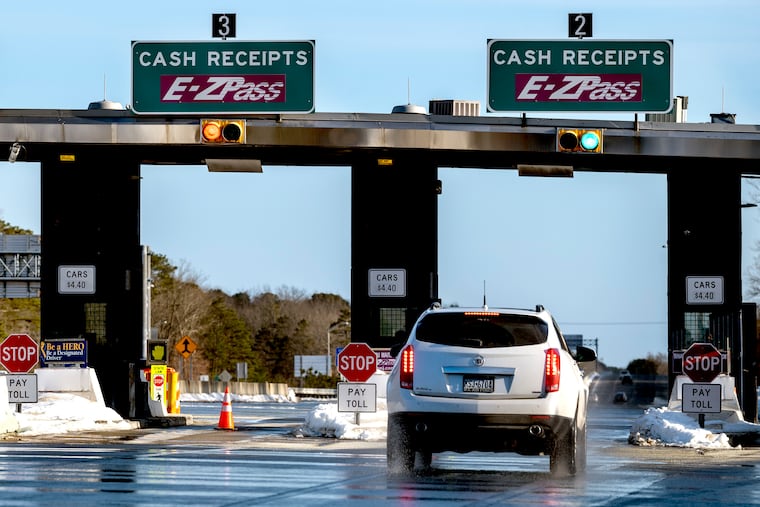New Jersey is moving to tear down its toll barriers for cashless collection
The Atlantic City Expressway will be the first of New Jersey's three toll roads to go cashless.

Tollbooths have sunk such deep roots in New Jersey life that it’s easy to imagine a picture of one with an outstretched hand on the state seal.
But the state is looking to go cashless on its toll roads, starting with the smallest of the three: the Atlantic City Expressway.
Tollbooths eventually would come down, replaced by gantries with E-ZPass readers and cameras to automatically record the license tags of vehicles without the transponders, whose owners would be billed by mail.
The South Jersey Transit Authority, which runs the expressway, is seeking bids for a contract to design, build, and operate an all-electronic toll collection system for its 44 miles from Camden County to Atlantic City, at an estimated cost of $77.8 million.
Officials anticipate the cashless system will be operational by May 2025 on the expressway, which has two large barrier toll plazas, at Egg Harbor and Pleasantville.
The contract proposal also asks bidders to provide “pricing options” for similar systems for the New Jersey Turnpike and the Garden State Parkway, though the timing of a changeover is less certain on those roadways.
Stephen F. Dougherty, executive director of the SJTA, said the agency has been planning for the transition for some time.
“The barrier plaza facilities have been in place since the inception of the road in the mid-’60s and are in need of replacement,” Dougherty said in a statement. All-electronic toll collection “provides a safer, environmentally conscious, fiscally responsible and expedited traveling experience.”
More than 55% of toll facilities in the United States are now cashless operations, representing nearly 3,600 miles of roads, according to the International Bridge, Tunnel & Turnpike Association, a toll roads group. The Pennsylvania Turnpike went cashless in 2020, a year earlier than expected.
The New Jersey Turnpike Authority, a state agency that runs the Garden State Parkway and the turnpike, has been talking about all-electronic tolls for more than a decade. It moved in 2010 to hire private toll collectors to replace government employees after a commission appointed by Gov. Chris Christie estimated the state could save $43 million a year.
That plan was abandoned after unions representing toll takers negotiated a contract with the authority that cut pay and made other concessions but saved their jobs.
Converting toll collection on the N.J. Turnpike and Garden State Parkway to E-ZPass and pay-by-mail is listed on the Turnpike Authority’s $24 billion long-range capital plan, but those projects have not yet been scheduled.
The plan estimates it would take $900 million to convert the roads: $500 million for the Parkway and $400 million for the Turnpike. Once the projects are put in the funding pipeline, it would take five years of planning on each before construction begins. Building the infrastructure would take 36 months.
Besides smoother travel, increased safety, and less tailpipe pollution, advocates of all-electronic toll collection often say authorities and governments will save big on personnel costs when they no longer have to pay human collectors. The picture is more complicated, however.
As E-ZPass use has increased, toll-collector jobs have gradually declined in number. Most drivers now use E-ZPass — 85% of motorists on the Expressway, 89% on the Turnpike, and 88% on the Parkway, according to New Jersey officials.
It also costs money to install a cashless system and to run it, making it difficult to calculate how much might be saved. The Pennsylvania Turnpike, which laid off about 600 toll takers and related employees in 2020, pays the vendor TransCore about $10 million a year to run the toll-by-plate system. It’s also spending $129 million to remove physical toll stations and locate gantries along its 551 miles of road.
» READ MORE: Pennsylvania Turnpike toll collectors are blindsided by sudden layoff
And then there’s “leakage.”
That’s what the industry calls uncollected tolls, and it’s been a big problem for the Pennsylvania Turnpike and other agencies that use pay-by-plate.
About $104 million in Pennsylvania Turnpike Authority tolls went uncollected in the fiscal year that ended May 31 last year, according to an internal turnpike document obtained by the Associated Press.
That means about 11 million turnpike rides during the year (out of 170 million) generated no revenue for the commission that runs it, the Associated Press reported. License plates were unreadable in 1.8 million transactions. The rest came down to bills being undeliverable or people refusing to pay what they owe.
Part of the problem: In many cases, tolling authorities have little or no leverage against out-of-state drivers who skip paying their debt because they can’t hold up vehicle registrations or license renewals as punishment, according to the IBTTA, which has a committee studying the issue.
The problem can be overcome with reciprocity agreements between or among states, but they can be complicated to reach, often requiring authorizing legislation. Pennsylvania Turnpike officials have said they are negotiating with Delaware and New York on these enforcement agreements.
The Delaware River Port Authority, operator of the Betsy Ross, Ben Franklin, Walt Whitman, and Commodore Barry toll bridges, plans to retain cash toll collection in addition to accepting E-ZPass.
“More than 30% of bridge users use our cash lanes,” spokesperson Mike Williams said in a statement. “The collection and enforcement process for electronic tolling is not mature enough for DRPA’s use. In addition, many motorists using cash may be unbanked, underbanked, or lack the capacity to deal with a relatively large monthly bill for tolls. We do not want to create a hardship for these customers.”